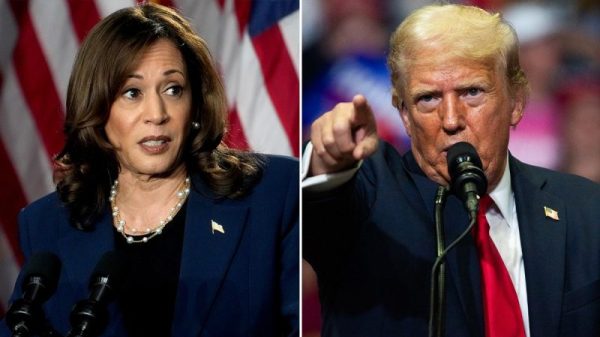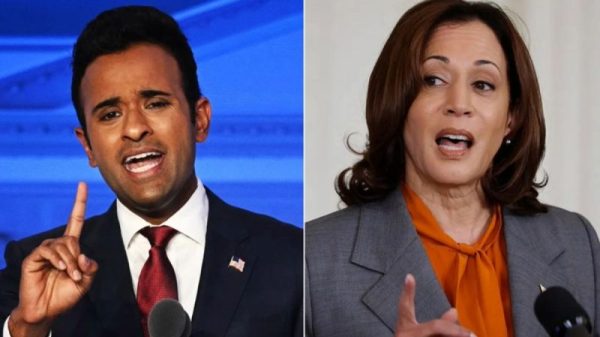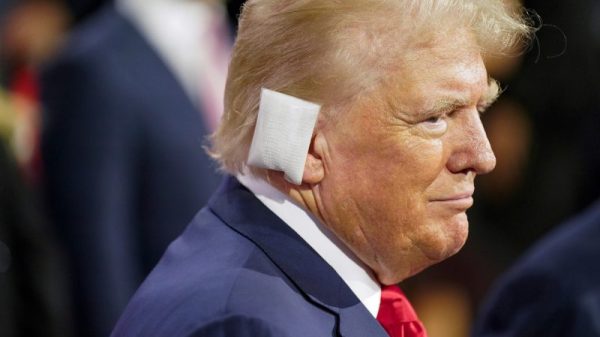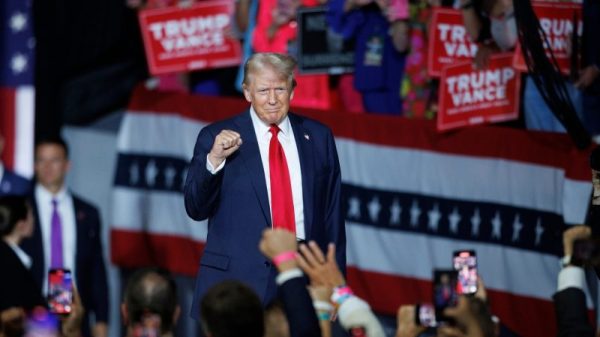Last week, Washington Post editor at large Robert Kagan wrote a lengthy opinion essay arguing that a second Donald Trump term would lead to a collapse of American democracy and the emergence of a Trump-led dictatorship. Understandably, the reaction was sweeping, including that it served as a prompt for Fox News host Sean Hannity’s question to Trump about his intentions should he regain power. (He wouldn’t be a dictator, Trump said — save for the day he took office.)
For many Trump allies, conditioned by people like Hannity to reject such criticisms should they even encounter them, this is a ludicrous idea. It is President Biden, they argue, who is acting like a dictator, using federal law enforcement to target his political opponents. This argument depends on the tenuous assumption that Trump, in attempting to overturn the 2020 presidential election and retaining documents with classification markings in defiance of a federal subpoena, broke no federal laws.
In service to that school of thought, Sen. J.D. Vance (R-Ohio) wrote a letter to the Departments of Justice and State to raise questions — pretty obviously in an ironic way — about Kagan’s purported efforts to stoke insurrection against the government. The letter was quickly derided by Trump’s (and Vance’s) critics: You’re going to defend Trump against charges of embracing dictatorship by demanding the government crack down on a journalist?
But that’s missing what should be the real concern about Vance’s letter, which is not intended to actually result in charges against Kagan. The real issue is that Vance’s letter is intended to performatively shrug at Trump’s post-2020 actions — and in so doing, show how Trump’s allies continue to create political space for him to subvert American democracy.
Vance’s Swiftian argument is that Kagan’s essay includes the suggestion that “[s]tates with Democratic governors and statehouses could refuse to recognize the authority of a tyrannical federal government,” a rejection of federal authority known as “nullification.” Vance notes that the Civil War was an extreme example of rejecting that authority.
“According to Robert Kagan, the prospect of a second Donald Trump presidency is terrible enough to justify open rebellion against the United States,” Vance writes, “along with the political violence that would inevitably follow.” That Kagan subsequently noted that Democratic governors probably wouldn’t do this anyway was ignored since it endangered Vance’s straw man: Kagan wants blue states to be the new Confederacy!
Why offer such a weird exaggeration? To defend Trump against his indictments, naturally.
“[P]rosecutors in the Department of Justice have embraced several stunningly broad interpretations of federal law in their bid to ensnare President Trump in criminal wrongdoing,” Vance writes. “For example, prosecutors have relied on a broad reading of 18 U.S.C. § 241 to argue that President Trump has conspired to ‘threaten’ or ‘intimidate’ one or more persons in their free exercise of the ‘right to vote, and to have one’s vote counted.’”
“By that standard,” he continues, “I would like to know whether a supporter of President Trump might be ‘intimidate[d]’ into foregoing the right to vote after learning that Robert Kagan has encouraged large blue states to rebel against the United States if Trump is elected.”
I can attest that writing a column for The Washington Post has a limited influence on the public, particularly the public predisposed to support Donald Trump’s reelection. No one reading Kagan’s essay will pick out the nullification bit and spend the next 11 months cowering in their attic, too afraid to go out and vote.
But that’s a side point. The important point is that Vance is disingenuously framing the charges against Trump.
It is true that the former president has been charged under 18 U.S.C. § 241. The indictment issued by a grand jury in D.C. in August includes such a charge. It’s not because he threatened the right to vote, though. It’s because he — allegedly, to use the required caveat — used intimidation to prevent votes from being counted.
“From on or about November 14, 2020, through on or about January 20, 2021” — that is, after the election — “in the District of Columbia and elsewhere, the Defendant, DONALD J. TRUMP did knowingly combine, conspire, confederate, and agree with co-conspirators … to injure, oppress, threaten, and intimidate one or more persons in the free exercise and enjoyment of a right and privilege secured to them by the Constitution” — the right to vote and have your vote counted.
If you would like, you can listen to a recording of Trump telling Georgia Secretary of State Brad Raffensperger in early January 2021 that Raffensperger should reverse the state’s election results and describing Raffensperger’s refusal to do so as “very dangerous.” Among other things.
Again, though, Vance’s intent isn’t really to have Kagan brought up on 18 U.S.C. § 241 charges. It is, instead, to downplay the charges against Trump, to join in the fantasy stoked by Trump that suggests his actions were no worse than anyone else’s. What Vance aims to do is not to deploy state power against Kagan but, instead, to undermine how state power is being used to hold Trump to account. (It’s important to note, though, that Vance’s letter does offer up Kagan’s wife, Biden administration official and long-standing right-wing target Victoria Nuland, as a more direct target of state power.)
In case there was any question about how forcefully Vance was winking at Trump’s base in writing the letter, he offers up four questions for which he is demanding answers from Attorney General Merrick Garland and the secretary of state. The first, by way of illustration, demands to know whether Kagan will face charges and, if not, why Trump did.
The deadline for a response? An upcoming Saturday, which is unusual — except that the Saturday is Jan. 6, 2024. Gotcha, libs! All of this “insurrection” stuff about Trump is silly, he’s saying, including the fixation on the day that Trump, let’s see here, actively stoked an effort to block Biden’s election by force. Good gag.
This is what’s disconcerting about Vance’s letter. It is understandable why the letter would be seen as ironic, given how he’s ostensibly seeking to have the government lean on a critic in the media. But he knows that Garland isn’t going to bring charges against Kagan. He knows, too, that his comparison between Kagan’s essay and Trump’s actions is silly.
The real revelation is that a senator who once disparaged Trump in unsparing terms now sees political value in trying to diminish Trump’s past efforts to subvert democracy. It’s that element of the letter that reinforces Kagan’s point.





























